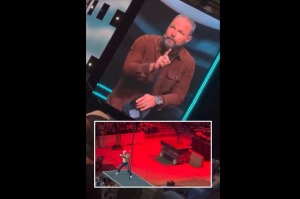Closing the distance between millennials and God

Every generation faces specific challenges, complex questions and critical choices. Millennials are no exception to the rule.
George Barna recently noted, “Three-quarters of the young adult segment, currently 18 to 37 years of age, contend that they are searching for their purpose in life.”
As millennials continue their search for meaning, they will undoubtedly continue to crave acceptance from their peers on social media. Peer acceptance is a huge priority for millennials.
But do millennials by and large want to be accepted by Jesus Christ? Barna writes, “Millions of them are consciously distancing themselves from God. Forty percent … do not know, do not care, or do not believe that God exists.” Sadly, God is not even on the radar of many young adults.
When you have no desire to know God, spiritual darkness permeates your soul. And spiritual apathy lies in stark contrast to this remarkable testimony in Scripture:
“As the deer pants for streams of water, so my soul pants for you, O God. My soul thirsts for God, for the living God. When can I go and meet with God?” (Psalm 42:1,2).
If 30% of the 72 million millennials in America developed a spiritual thirst for Christ, over 20 million young adults could discover the reason God created them. A spiritual revival among millennials would certainly be transformative on multiple levels. We can pray daily for such a miraculous move of the Holy Spirit (Luke 11:5-13).
Two of my previous CP op-eds that deal with spiritual desire are titled: “Drink Until You are Thirsty,” and “Eat Until You are Hungry."
When you assume that you do not have a Creator in Heaven who formed you in your mother’s womb, you place yourself at a real disadvantage (See my recent CP op-ed, “When Did God Create Adam and Eve?). Those who reject the Creation story in Genesis typically choose to ignore the New Testament narrative describing the death and resurrection of Jesus Christ. Your view of the Bible reveals a lot about the condition of your soul.
Jesus said, “Man does not live on bread alone, but on every Word that comes from the mouth of God” (Matthew 4:4). The Messiah also said, “I am the bread of life. He who comes to me will never go hungry, and he who believes in me will never be thirsty” (John 6:35). Until you “taste and see that the Lord is good,” (Psalm 34:8) you really have no idea what you are missing.
Unbelief leaves a black hole in your soul. You remain oblivious to how far your sins have separated you from your Creator, and you have no sense of accountability to God. Some even go so far as to claim there is no God. When you surrender your soul to atheism rather than to Jesus Christ, you drift in spiritual darkness. And you fail to understand why you are here on Earth in the first place.
When the Holy Spirit was poured out on about 120 followers of Christ on the Day of Pentecost, (Acts 1:15 - 2:13) God provided the solution to man’s spiritual apathy. Man, by nature, wants little if anything to do with God, and is unaware of how dangerous it is to ignore Jesus Christ. (See my recent CP op-ed, “5 Critical Facts about Life after Death.”)
If you have no desire to know Jesus Christ, you are in hot water my friend. You may say, “The water does not feel hot to me. In fact, I tend to like it. I prefer independence rather than relying upon a God that I am not even sure exists.”
Our sinful nature makes us apathetic and even antagonistic toward our loving Creator, even though God offers us peace in this life and perfection in the world to come. In essence, what meth does to the body, sin does to the soul.
Anyone who has a flippant attitude toward their sin and toward the Lord needs a complete spiritual makeover. This transformation begins when you trust Jesus to forgive your sins and save your soul (John 3:1-7).
Right now, you may have zero interest in knowing God. James offers this wise counsel to those who are keeping God at a distance:
“Come near to God and He will come near to you” (James 4:8).
Have you ever come near to God? If not, you have no idea how a relationship with your Creator would impact your life. After all, “Jesus Christ is the true God and eternal life” (1 John 5:20). “And by Him all things were created; things in Heaven and on Earth, visible and invisible” (Colossians 1:16).
How many millennials will continue to distance themselves from the Creator of all things? And how many will begin to draw close to the Messiah through Scripture, prayer and asking the Holy Spirit to open their eyes to the truth? Jesus is “the Savior of everyone, and especially of those who believe” (1 Tim. 4:10).
Life with God begins when you accept Christ as your Savior, as I described in a 2014 CP op-ed: “Accepting Christ Involves Knowing God Accepts You.”
Millennials have an amazing opportunity to experience God’s love. (1 John 3:16; 4:16) How many of them will seize this “millennial moment” in time and meet the Messiah? Generations throughout history come and go, but “Jesus Christ is the same yesterday and today and forever” (Hebrews 13:8). You will have eternity to reflect upon what you did in response to what Jesus Christ did for you 2000 years ago.
God came near to you when He left Heaven to come here and die on the cross for your sins and mine. “Christ died for sins once for all, the righteous for the unrighteous, to bring you to God” (1 Peter 3:18). Will you take the next step to close the distance between yourself and God?
You could begin right now by praying: “God … please convict me of my sin, and please show me my Savior. In Jesus’ name. Amen.” And then read or listen to the Gospel of John as you start drawing closer and closer to Christ.
Dan Delzell is the pastor of Redeemer Lutheran Church in Papillion, Nebraska.




























